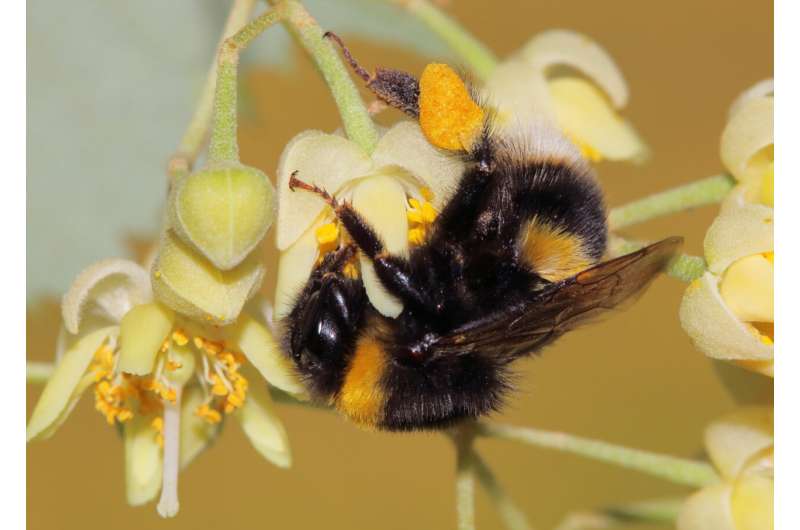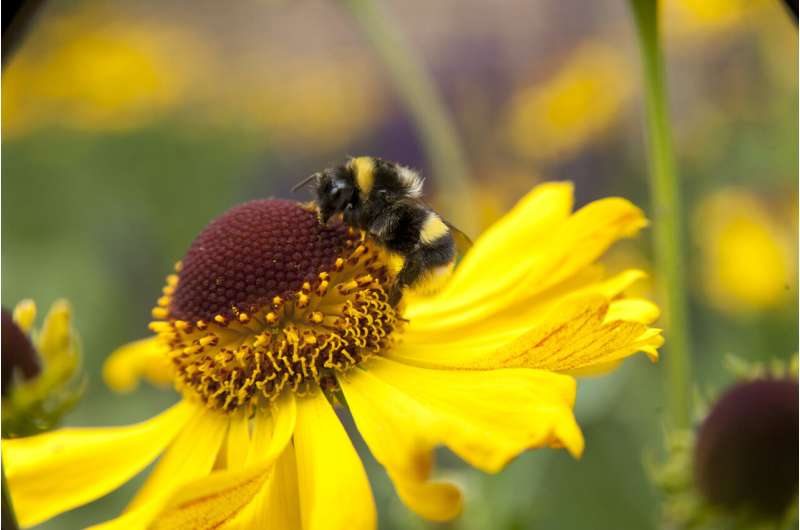#Scientists discover how bees activate natural medicine against parasite infection during pollination

Table of Contents
“Scientists discover how bees activate natural medicine against parasite infection during pollination”

In a new paper published today in a special issue of Philosophical Transactions of The Royal Society, Kew scientists and partners report on how bees activate the “medicinal” properties of various nectars to protect themselves from parasite infections.
The team of researchers led by Kew scientist Dr. Hauke Koch, in partnership with Professor Mark Brown at Royal Holloway, University of London, collected nectar and pollen samples from linden and strawberry trees at Kew Gardens in West London to determine how bees process the beneficial compounds found within. The researchers found that two compounds naturally found in the nectars of these species are activated by the bees’ digestive processes, the gut microbiome (microorganisms) or a combination of both.
The study’s primary aim was to discover how these elements and their anti-parasitic qualities can protect bees from the common gut parasite Crithidia bombi. The experiments yielded promising results for bee conservation efforts at a time when pollinators face the increasing threat of decline from climate change, disease, and habitat loss due to agriculture and land use.
Pollination by animals is one of the world’s most important species interactions, as plants offer a nutritious reward to insects, birds, and small mammals in exchange for the transfer of pollen. Not only does this process facilitate the reproduction of many plants, but it also serves to support global food production and ecosystems. Scientists are, therefore, alarmed to see mounting evidence of declines in pollinator abundance and diversity.
Among the threats faced by pollinators today are the dangers posed by parasites. Bee parasites can be introduced and spread through global trade routes, and can spill over from managed honeybee colonies to wild pollinators. Their effects on bees are worsened by other stress factors such as pesticide use affecting microbiome health. The bumblebee gut parasite C. bombi is of special interest to scientists, as the parasite is common and known to threaten the survival and development of bumble colonies.
Dr. Hauke Koch, Research Leader in Pollinator Biological Chemistry at RBG Kew and lead author of the paper, says, “Pollinators have diverse microbiomes in their guts and nest environments. These communities of microorganisms can be important for the health of pollinators, for example by defending them against diseases or producing important nutrients. By better understanding the functional importance and contributions of individual members of the microbiome to different pollinators, we may in the future be able to better support their health.
“For example, managed honeybee and bumblebee colonies can be supported through novel probiotics, or healthy microbiomes in wild pollinators can be maintained through a restriction in pesticides that negatively affect the microbiome and through the promotion of plants with nectar or pollen chemistry that stimulate healthy microbiomes.”
The first compound analyzed by the team, unedone, was found in the nectar of strawberry trees (Arbutus unedo) and was extracted from strawberry tree honey. The evergreen, shrubby tree is native to Ireland, Western Europe and the Mediterranean, and commonly planted in parks and gardens in the UK. Its nectar and pollen-rich flowers are known to be an important food for bumblebees in the autumn. Honeybees produce a bitter-tasting honey from it that is sought after around the Mediterranean.

The compound unedone was tested on C. bombi cultures grown in a lab as well as on buff-tailed bumblebee (Bombus terrestris) gynes (female bees capable of reproduction) collected at Kew in the autumn of 2018. The latter part of the experiment saw the researchers feed the bees a mix of sugar syrup and pollen over a two-week period, after which their feces were screened for parasites. Select bees were then given a treatment of sugar syrup or a treatment of unedone. The compound was found to inhibit C. bombi infections but only after interacting with the microbiome, as the initial metabolic processes in the mid-gut rendered it inactive against the parasite.
The researchers also determined that tiliaside, a compound extracted from the nectar of the linden tree, offers similar benefits to buff-tailed bumblebee workers. However, in contrast to unedone, tiliaside was found to be activated by the bees’ own digestive processes. Both compounds have been put forward as evidence of the benefits that food and microbiomes hold for protecting and strengthening pollinator health—at an individual and community level.
Professor Phil Stevenson, Head of Trait Diversity and Function at RBG Kew, and study co-author, says, “Understanding the drivers of pollinator health—both good and bad—is critical to realizing how we can best support pollination services and continue to benefit from their contributions to food production and sustaining natural ecosystems.
“We now know that some flowers provide better nutrition for some species while others provide bees with a natural medicine, so we can select plants for restoring degraded landscapes or crop field margins that provide multiple and tailored benefits to pollinators enhancing their health from individual through to community level.”
In addition to the dangers posed by parasites, pollinator decline is being driven by pesticide use, the intensification of agriculture, and climate change. Scientists are thus keen to better understand the natural processes that influence and affect pollinator health—both positively and negatively. These processes include the nutritional quality of pollen and nectar, the impact of parasites and the benefits of the microbiome, as well as the effects of natural bioactive compounds and landscape structure.
Stevenson adds, “The impacts of human activities on pollinator health and decline through excessive pesticide use, climate change and agricultural intensification are now widely accepted after decades of evidence gathering.
“We now need to look for solutions and ways of sustaining diverse and healthy populations of pollinators and other insect groups. Many of these solutions can be developed through a better understanding of the natural processes that influence pollinator health. If we know how nutrition varies across the pollen of different species and which species provide the best food resources for the widest range of pollinating species, we can implement restoration programs such as field margin planting and ecological corridors with much better accuracy to the species of importance and with long-term benefits.”
Saving heather will help to save our wild bees
Hauke Koch et al, Host and gut microbiome modulate the antiparasitic activity of nectar metabolites in a bumblebee pollinator, Philosophical Transactions of The Royal Society (2022). DOI: 10.1098/rstb.2021.0162
Citation:
Scientists discover how bees activate natural medicine against parasite infection during pollination (2022, May 1)
retrieved 2 May 2022
from https://phys.org/news/2022-04-scientists-bees-natural-medicine-parasite.html
This document is subject to copyright. Apart from any fair dealing for the purpose of private study or research, no
part may be reproduced without the written permission. The content is provided for information purposes only.
If you liked the article, do not forget to share it with your friends. Follow us on Google News too, click on the star and choose us from your favorites.
For forums sites go to Forum.BuradaBiliyorum.Com
If you want to read more Like this articles, you can visit our Science category.



